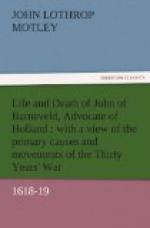As Philip II., and Ferdinand II. echoing the sentiments of his illustrious uncle, had both sworn they would rather reign in a wilderness than tolerate a single heretic in their dominions, so James had said “he would rather be a hermit in a forest than a king over such people as the pack of Puritans were who overruled the lower house.”
For the Netherlanders he had an especial hatred, both as rebels and Puritans. Soon after coming to the English throne he declared that their revolt, which had been going on all his lifetime and of which he never expected to see the end, had begun by petition for matters of religion. “His mother and he from their cradles,” he said, “had been haunted with a Puritan devil, which he feared would not leave him to his grave. And he would hazard his crown but he would suppress those malicious spirits.” It seemed a strange caprice of Destiny that assigned to this hater of Netherlanders, of Puritans, and of the Reformed religion, the decision of disputed points between Puritans and anti-Puritans in the Reformed Church of the Netherlands.
It seemed stranger that his opinions should be hotly on the side of the Puritans.
Barneveld, who often used the expression in later years, as we have seen in his correspondence, was opposed to the Dutch Puritans because they had more than once attempted subversion of the government on pretext of religion, especially at the memorable epoch of Leicester’s government.
The business of stirring up these religious conspiracies against the magistracy he was apt to call “Flanderizing,” in allusion to those disastrous days and to the origin of the ringleaders in those tumults. But his main object, as we have seen, was to effect compromises and restore good feeling between members of the one church, reserving the right of disposing over religious matters to the government of the respective provinces.
But James had remedied his audacious inconsistency by discovering that Puritanism in England and in the Netherlands resembled each other no more than certain letters transposed into totally different words meant one and the same thing. The anagrammatic argument had been neatly put by Sir Dudley Carleton, convincing no man. Puritanism in England “denied the right of human invention or imposition in religious matters.” Puritanism in the Netherlands denied the right of the legal government to impose its authority in religious matters. This was the great matter of debate in the Provinces. In England the argument had been settled very summarily against the Puritans by sheriffs’ officers, bishops’ pursuivants, and county jails.




